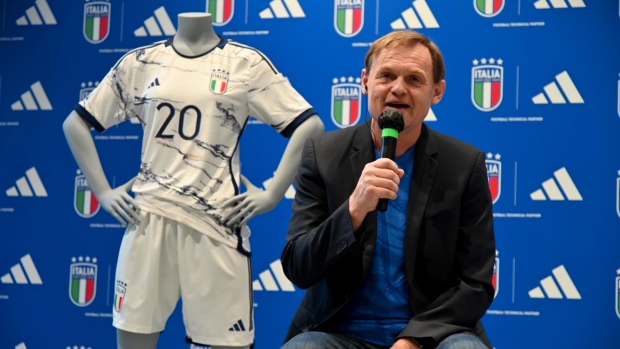Mar 8, 2023
New Adidas CEO Promises Turnaround by Cutting Inventory, Rebates
, Bloomberg News

(Bloomberg) -- Adidas AG slashed its dividend and shook up its management as new Chief Executive Officer Bjorn Gulden tries to turn around the crisis-beset German sports brand.
Despite vowing to speed up decision-making, Gulden held off on the biggest question investors are asking of the German sportswear company: What will it do with $1.3 billion worth of unsold Yeezy gear?
With no immediate answer forthcoming and Adidas saying there’s only a 15% to 30% chance it’ll sell the remaining products from its now defunct partnership with the rapper known as Ye, the current year will be challenging.
To help make Adidas faster, Gulden said he’s personally replacing Brian Grevy, the head of global brands, who is leaving the company. The new CEO said Wednesday he still plans to return to profitable growth in 2024 by building brand awareness, reducing discounts and chipping away at excess stockpiles of sneakers and apparel.
If Adidas writes off the unsold Yeezy products — old versions of which continue to fetch high prices on sites like eBay — it would lower the company’s operating profit by €500 million ($527 million) and lead to Adidas’s first annual loss in more than 30 years.
Adidas’s entire stockpile of unsold sneakers and apparel had a value of about €6 billion as of the end of December, up 49% from the prior year. That situation had already been a problem even before Adidas in October cut ties with Ye, formerly known as Kanye West, after he unleashed a string of hateful and antisemitic rhetoric.
The stock fell as much as 2.4% in morning trading in Frankfurt.
Adidas has initiated arbitration proceedings against Ye claiming damages, the company said in the annual report. While Ye’s side has filed counterclaims, Adidas said it currently doesn’t expect that will lead to any cash outflow.
Among other management changes, Arthur Hoeld will become head of global sales in April, replacing Roland Auschel who is leaving after a 33-year career at Adidas.
Gulden is looking to pivot beyond the Yeezy fiasco and build brand heat again with a strategy that “balances global direction with local needs, that is fast and agile,” he said in the statement.
Catering products to local markets is becoming a particularly urgent problem in China, once Adidas’s growth engine. Sales in the Asia-Pacific region plunged 31% in 2022, in large part because Adidas failed to overcome the country’s widespread boycotts of western brands.
Adidas proposed slashing the annual dividend by 79% to 70 cents.
(Updates with chance of selling Yeezy gear in third paragraph)
©2023 Bloomberg L.P.


